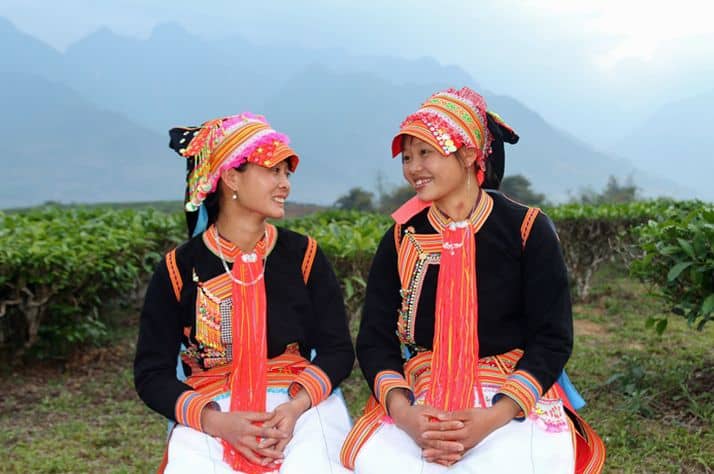


By Emily Arneson, public health intern for Samaritan’s Purse in Vietnam
Recently in northwestern Vietnam, Samaritan’s Purse trained 15 women trained as traditional birth attendants. They are the fourth group of attendants to attend the six-month training. In February, we hosted the second annual gathering of all trained traditional birth attendants for a knowledge exchange.
Not only was it a time to review the information, but it was also a time of reunion and fellowship for attendants who had trained together. Each woman wore her traditional clothing, as all of them come from ethnic minority backgrounds, and it was a time to celebrate their training and their important work. As they gathered over meals, the women shared their experiences.
I had the opportunity to interview several traditional birth attendants to learn more about why their work is important in their areas. Hang Thi Ve is 20 years old. She is married with a 14-month-old son. Her dream was to receive training to help the women in her community who give birth at home.
Ve completed her training with Samaritan’s Purse in 2016. She now counsels women during their pregnancies and encourages them to deliver at a local clinic. She was thankful to be trained as it allows her to combine knowledge and experiences to help her village.
Ve shared the story of a woman who delivered at home and had complications with bleeding for several days. Ve helped her get to the hospital and now mother and child are doing well. A challenge she faces is getting the women in her community to listen and apply what she is teaching them. They can be resistant to delivering in a health center and want to deliver at home. But we trust that, over time, Ve’s influence will strengthen and her community will change. Ve shared that being a traditional birth attendant is her mission, and she is ready to help.
As traditional birth attendants, these women serve as resources to their communities. I interviewed Tan Xa Nhi and Lu Thi Van together. They were trained in 2014 and are dear friends. Nhi is 21 years old and has one child. Van is 23 years old and has two children. Both Nhi and Van shared about the love they have for their local people and the needs the communities face. They are the first birth attendants in their communities. They have assisted with some deliveries, but it is the counseling of many women that has broadly impacted their communities.
Women in their communities feel shy, especially regarding healthcare. But traditional birth attendants travel to the women’s homes to directly provide care and counseling, making them feel more comfortable and receptive to the care. Van shared the story of a woman whom she assisted in delivering at home because she was unable to get to the clinic due to rain. Van had a big smile on her face as she shared that the baby was delivered safely, and she was thankful she was able to save this baby’s life by assisting with the delivery.
In all these women, I saw joy on their faces as they shared about their work. They were all thankful to Samaritan’s Purse for the training to impact and help women in their communities. These women are leaders, and their work will improve the health of their entire communities.
Truong, who works for Samaritan’s Purse and helps each class of traditional birth attendants, shared about the poor practices that lead to a high rate of infant death in these communities. She was moved and had deep compassion for this problem. Truong is thankful that these women can get the professional knowledge to care for mothers and babies to reduce mortality rates.
These traditional birth attendants are helping small communities throughout the northern highlands of Vietnam. They are leaders, and, through their work, they are seeing that many women, especially from poor communities, are getting better antenatal care, safer deliveries, and better health.
The hardships women in the developing world face often leave them without hope. Through your generous gifts, Samaritan's Purse is working to restore the hope of women through programs aimed at increasing literacy, providing maternal health care, teaching livelihood skills, and stopping trafficking and prostitution.